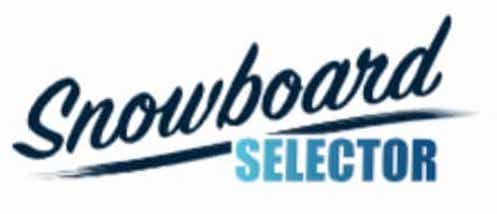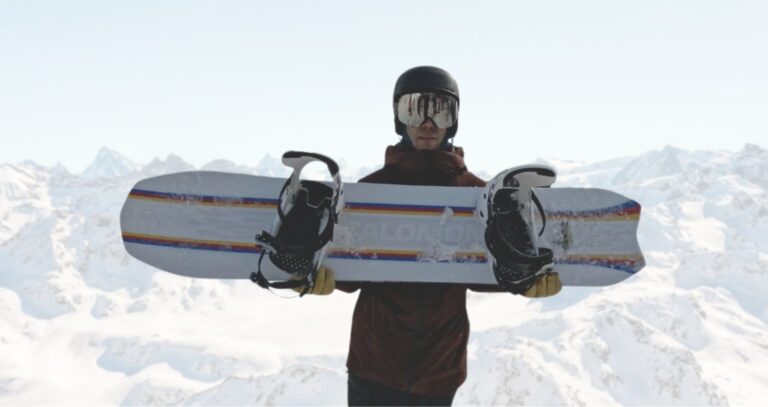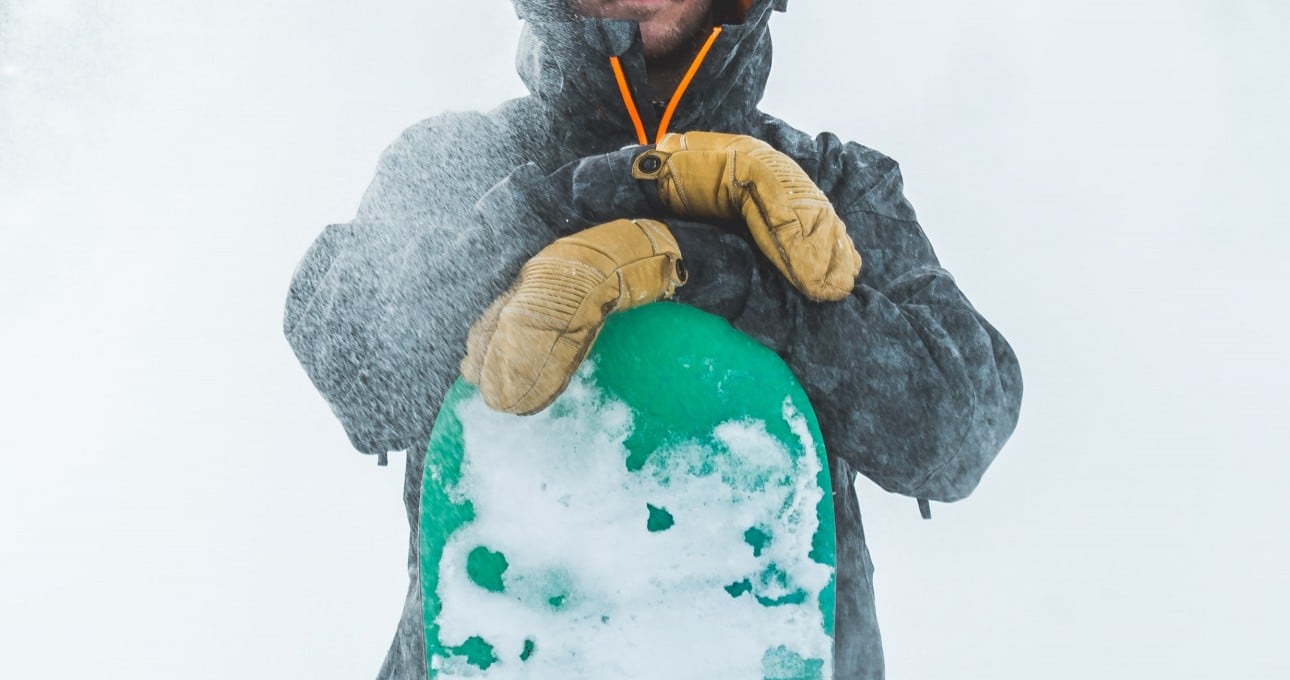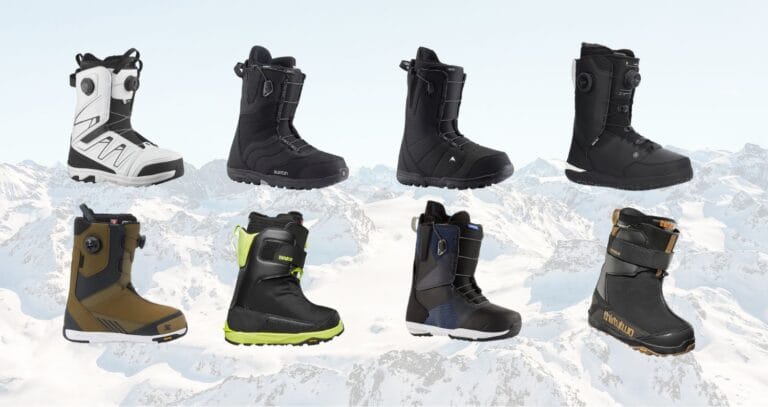If you are a snowboarder looking for one board that you can use everyday on the mountain, then you'll probably be needing an All-Mountain snowboard. All-Mountain boards allow you to ride everything the mountain can throw at you, from groomers to powder to park laps.
Don't know what size snowboard to get? Try out our snowboard size calculator to help take the guesswork out of finding a new board.
NB: This article has been updated for the upcoming 2026 snow season with new season models.
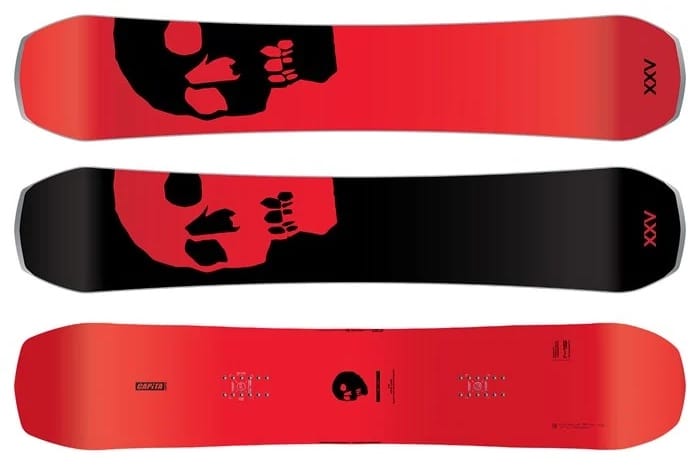
Capita BSOD
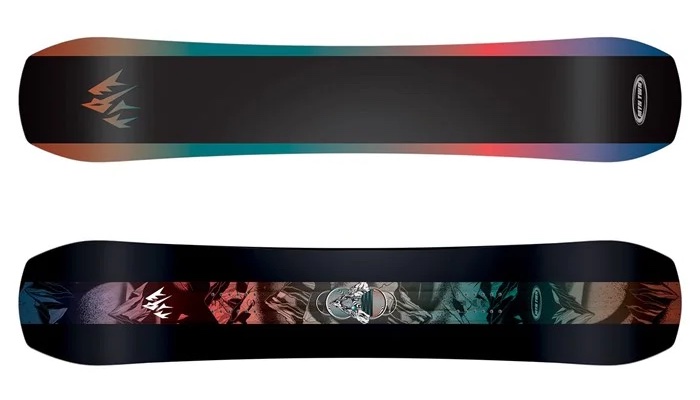
Jones Mountain Twin
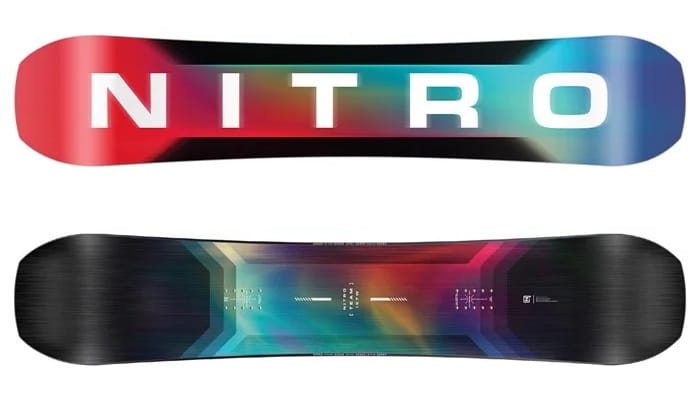
Nitro Team
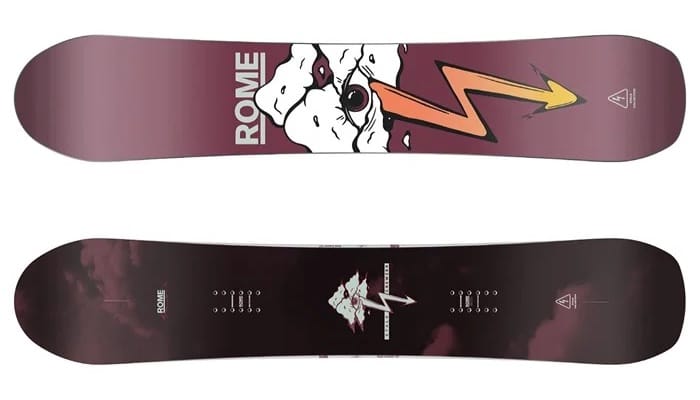
Rome Stale Crewzer
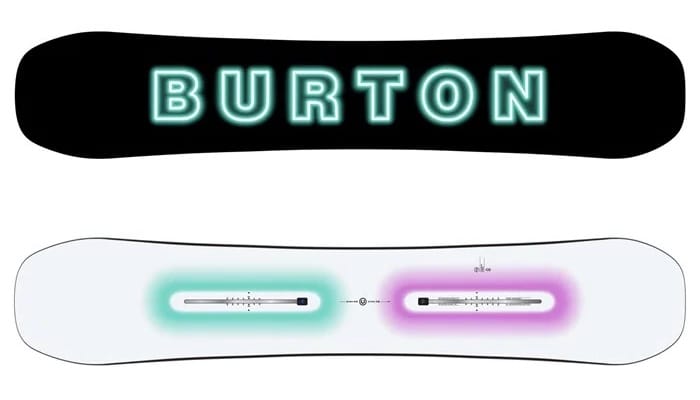
Burton Custom
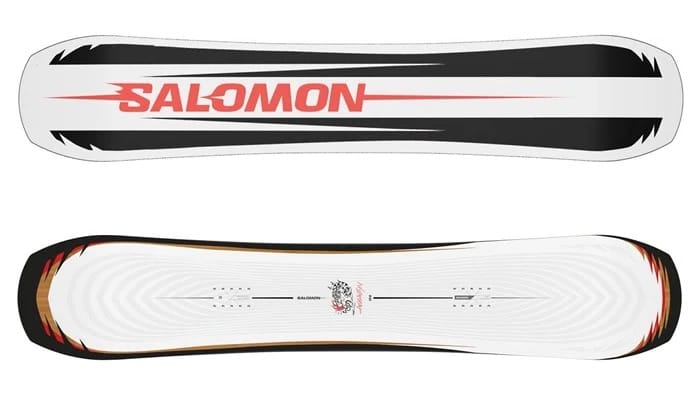
Salomon Assassin
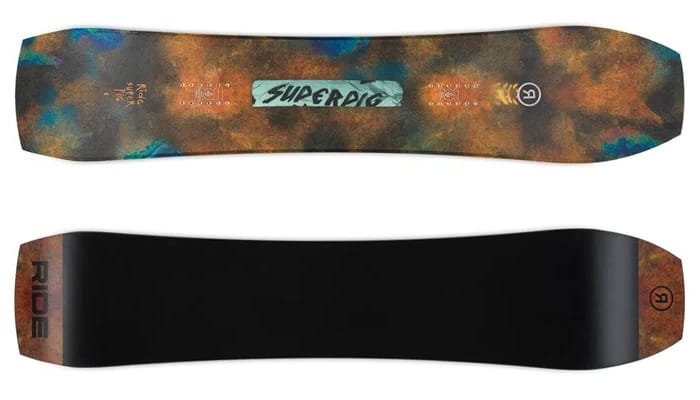
Ride Superpig
Reverse-normal-flat
Camber/rocker
True camber
Fusion camber
Camber
Rock out camber
Directional extra camber
Flex 6.5/10
Flex 6/10
Flex 7/10
Flex 6/10
Flex 4-7/10
Flex 8/10
Aggressive response
$749.95
$579.95
$579.95
$599.95
$679.95
$649.95
$649.95
Why I Picked These Boards
These boards meet all the requirements that go into making a great All-Mountain snowboard. Each of them has slightly different characteristics to suit different riding styles so hopefully there's a board for everyone.
My Pick of Best All-Mountain Boards 2026

Capita The Black Snowboard of Death 2026
Price: $749.95
Flex: 6.5/10
Shape: Directional
Camber: Mid-body normal camber, flat tail, reverse nose
Capita’s flagship board is basically designed for one thing – charging around the mountain. It has its customary stripped back black graphic but beneath that there's quite a lot of tech going into this board. The camber profile has a positive camber between the feet and early rocker in the nose, incorporated with a directional shape with a slight setback stance to help lift you above the snow.
In my experience, often times a rocker in the front of a board means you lose a bit of edge control. Capita have resolved this with their Death Grip™ edge sidecut (they like their morbid names!), which introduces a tighter sidecut in the middle of the board to help whip around the turns.
The flex is a 6.5/10 which gives it plenty of pop and makes it rigid enough to cope with anything the mountain can throw at it. Diagonal carbon rods in the tip and the tail give it plenty of torsional rigidity to stop the edge skipping out during the turns.

Jones Mountain Twin 2026
Price: $579.95
Flex: 6/10
Shape: Directional Twin
Camber: Camber/Rocker
The Jones Mountain Twin is a directional twin board designed to turn the whole mountain into a terrain park. It has a medium flex so is nice and easy to ride with traditional camber between the bindings rising up into the tip and tail with early rocker sections to keep you floating above the snow.
The base has a slight contour to it at the tip and tail creating a slight spoon section to reduce drag in the snow and minimize the risk of catching an edge. In my opinioin, these features combine to make a really easy to ride board which allows Jones to crank up the stiffness and to give more stability at speed and more pop and responsiveness.
It uses Traction Tech 3 edges which incorporate three bumps on each edge between the bindings mounts to give extra bite into hard snow.

Nitro Team 2026
Price: $579.95
Flex: 7/10
Shape: Directional Twin
Camber: True Camber
The Team is one of Nitro’s oldest models and although it has changed a lot over time, its function as all mountain/freestyle machine remains the same. Like the Burton Custom, it has a directional twin shape with a slight binding setback to offset the twin profile. Nitro have kept it simple with the camber profile with a full length traditional camber from contact point to contact point.
It has a progressive sidecut whereby the side turn radius tightens towards the tail of the board and gives more control when riding fast in the turn.
In my view, the Team is a board for advanced riders who like to haul ass! With a 7/10 flex it's pretty stiff, but it's also easy to ride at lower speed thanks to the board's Reflex Core Profile. This makes the board thinner in the center to give more torsional flex for easy low-speed turn initiation
For bigger riders, it has a progressive width, which means each size in the range gets slightly wider. This is a simple but effective idea from Nitro, which makes choosing a size easier as generally speaking bigger guys have bigger feet, meaning you don't need to worry about choosing a wide version of a board or not

Rome Stale Crewzer 2026
Price: $599.95
Flex: 6/10
Shape: Directional Twin
Camber: Fusion Camber
Although the Stale Crewzer looks to have a real old-school directional shape, it's actually a directional twin, meaning it has a twin shape from contact point to contact point but with a slightly set back stance. What gives it its directional look is the shape of the tip and the tail, but these will only really affect the ride when you are in deep powder. This means on the groomers it will ride like a directional twin meaning you can lap the park and everyone will know whether you are coming in switch or not.
It has pretty much a traditional, negative camber profile, but Rome have introduced small flat sections just before the board transitions into rocker at the tip and tail. These flat sections help give the board a predictable catch-free turn initiation and the camber gives all the pop and power that you’d expect from a traditional camber board.
It has a flex of 6/10 making it a little softer that a lot of the boards on this list, which is reflected in its playful freestyle feel. It has Rome’s Carbon HotRod which extend out from the binding insert towards the tip and tail and give the board plenty of pop.

Burton Custom 2026
Price: $679.95
Flex: 4-7/10
Shape: Directional
Camber: Camber
The Burton Custom is probably the most iconic snowboard out there. Although it has undergone a lot of developments in its 25+ years, its basic form remains largely unchanged. I find the quality of the materials and the build of this board make it a super durable, fast and reliable snowboard which you’ll be able to ride everyday of the season. It is an All-Mountain Freestyle board aimed and intermediate to advanced riders who want one board that does it all.
It has a twin profile and a twin flex, with only a slight setback on the stance giving it a directional feel. This makes it a perfect choice for anyone looking for an AM snowboard but likes to spend a lot of their time in the park.
It has a medium flex which makes it great for lower speed freestyle moves and also makes it accessible for intermediate riders.
Another highlight are the Frostbite edges which slightly protrude out from under the bindings to give extra grip right under your boot where you can apply the most pressure.

Salomon Assassin 2026
Price: $649.95
Flex: 8/10
Shape: Directional Twin
Camber: Rock Out Camber
The Salomon Assassin is a do-everything board which you’ll be able to ride everyday of the winter. It's a medium flex, directional twin but has plenty of tech features to set it apart from the crowd. It is a hybrid camber board with a flat section between the bindings for stability and camber sections under the feet for pop and responsiveness, then rocker in the tip and tail to help lift the board out of the snow.
The board has a quadratic side cut which combines 4 different sidecuts which kick in throughout the different parts of the turn. This guarantees edge control in all kinds of turn from high speed carving to tight turns in the trees.

Ride Superpig 2026
Price: $649.95
Flex: Aggressive Response
Shape: Tapered Bi-Radial Sidecut
Camber: Directional Extra Camber
The Ride Superpig is the only volume shift board on this list. Volume shift boards essentially swap length for width to give a board which is shorter (easy to maneuver), but wider, so still has the same float in powder. This type of board is normally designed as a pure powder board but Ride have combined volume shift with more traditional camber to produce an All-Mountain board which rips on and off the pistes.
The board has a long, drawn out rocker in the nose, which blends into a camber section under the bindings. This camber section helps give pop and responsiveness when the board is put on an edge on the groomers. The mellow rocker in the tail to help give a smooth turn transition and helps you stay on your feet when buttering in the powder.
The board has a Bi-Radial Sidecut which gives a high performance turn radius between the feet to help with carve turns on the groomer.
It has a medium flex, making it one of the softer boards in this list but the extra width under the feet gives it extra bite, so that your edges won’t skip out during turns.
What is an All-Mountain Snowboard?
An All-Mountain snowboard is the most versatile type of snowboard. It is a jack-of-all-trades snowboard which is suited to all kinds of terrain and riding that you can find on a mountain. This might be anything from groomed trails to jumps and rails in the park, to deep powder. As a result, All-Mountain snowboards kind of tend to be not ideally suited to any one style of riding but at the same time won't hold you back from dropping off the side of the trail on a powder run, or sneaking in the odd park lap.
If you only have one snowboard then you probably want to make it an All-Mountain snowboard.
What Makes A Good All-Mountain Snowboard?
Because you want an All Mountain snowboard to be good at everything, it can't be too suited to any one kind of riding, meaning it can’t have too many of any of the characteristics which make a board good for powder, park, or carving. These characteristics are shape, length, camber, and stiffness:
Snowboard shape
As you’ll be spending the majority of your time riding in your natural stance – not switch – an All-Mountain snowboard should have a slightly directional shape, this means that the board is shaped to ride slightly better forwards than backwards. A directional shape means the binding mounts and the waist of the board are setback towards the tail. This gives you a bit more nose at the front of the board for smooth turn initiations and extra float through the powder or over bumps.
If you want an All-Mountain board, but you are more into your freestyle, then you could go for an All-Mountain Freestyle board which has a directional twin shape. Directional twins are a symmetrical twin shape but have the binding mounts slightly set back. They basically ride like a true twin freestyle board but have a little extra length in the nose for cutting through variable snow and powder.
Snowboard camber
There are so many different camber profiles available these days and there are more than one type that will suit an All-Mountain snowboard, but as a general rule the board should have some section of normal camber along its length.
A normal camber board has a concave shape so that the center of the board rises about 1cm off the ground when unweighted. This concave shape gives the board a lot of its pop and control when put on an edge.
Then there are hybrid cambers which combine sections of rocker and camber. The only hybrid cambers that I would recommend are ones where there is normal camber under the bindings. This is the important part of the board where the power goes through, so this is where you want that camber shape.
Snowboard flex
If you want a board that is going to be able to handle all kinds of snow and terrain then it needs to have a little stiffness to it. This kind of aggressive All-Mountain snowboard has enough stiffness and torsional stiffness to enable the board to hold an edge through all kinds of snow and at higher speeds.
Soft boards are great for low speed freestyle and butter tricks but if you want to be able to blast around the mountain then you need the extra stability that comes with stiffness. Most brands have 1-10 rating for their boards stiffness, I would recommend going for 6+ on this scale. Then it depends how aggressive you like to ride and how heavy you are; the more aggressive and heavier needing more stiffness.
All-Mountain Snowboard FAQs
Wrapping Up
Finding the best All-Mountain snowboard is all about choosing a board that matches your riding style, skill level, and the terrain you love to explore. Whether you’re carving groomers, tackling powder, or hitting the park, the right All-Mountain snowboard can unlock endless possibilities on the slopes. As an instructor, I think having a do-it-all board is essential; you just don't know what the day will throw at you!
